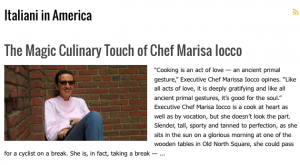 “Cooking is an act of love — an ancient primal gesture,” Executive Chef Marissa Iocco opines. “Like all acts of love, it is deeply gratifying and like all ancient primal gestures, it’s good for the soul.” Executive Chef Marisa Iocco is a cook at heart as well as by vocation, but she doesn’t look the part. Slender, tall, sporty and tanned to perfection, as she sits in the sun on a glorious morning at one of the wooden tables in Old North Square, she could pass for a cyclist on a break.
“Cooking is an act of love — an ancient primal gesture,” Executive Chef Marissa Iocco opines. “Like all acts of love, it is deeply gratifying and like all ancient primal gestures, it’s good for the soul.” Executive Chef Marisa Iocco is a cook at heart as well as by vocation, but she doesn’t look the part. Slender, tall, sporty and tanned to perfection, as she sits in the sun on a glorious morning at one of the wooden tables in Old North Square, she could pass for a cyclist on a break.
She is, in fact, taking a break — from her work at Gennaro’s, the iconic Italian restaurant at the corner of the cobblestone-paved Square and Salem Street. It is the latest in a long series of restaurants that she has taken in hand like bread dough and shaped into successful operations. Umbria, Mare, Bricco plus another dozen fine dining venues in Boston have one thing in common: In one capacity or another — either as consultant or executive chef — Marisa was there.
“I am blessed with an incredible success rate: Up there, somebody probably loves me,” she says as she looks up, taking her eyes for a moment off of her notes for a memoir that is destined for publication. “I almost became an architect, but the love of food passed on to me by my family took over,” she says by way of summary of a coming-of-age story that began in Orsogna in the Abruzzi region, which she describes as “a wonderful little town between the Maiella mountains and the sea.”
“I came to America to learn English,” she explains. “My father and a few good friends of mine were here. It almost started as a joke and now 27 years later, here I am … still!” And she does not seem at all tired of it, and why should she be? After all, Boston is the city where she became who she is — one of the most sought-after executive chefs and restaurant consultants in the area. “They come look for me now. It is wonderful to be looked for,” she says with a rare smile.
After a rocky start in what she remember as a “wonderful, huge but gender-biased kitchen,” she managed to win over the “male supremacists” around her, by asking the owner to be put her in charge of the operation, and then working 90 hours weeks for a year and a half and letting her work speak for itself.
At that point, she was ready to open her own place. Her Galleria Italiana brought Italian gourmet dining to an area now fancy but then known as the “combat zone,” while it wrote her name on the local and national A-list. Over the course of 11 years — before skyrocketing rents drove her away — she earned recognition as the “best corn muffin maker in town” from the Boston Herald and as one of the best Italian restaurants in America by the world-renowned Veronelli guide.
What followed was an uninterrupted string of success in managing, consulting and cooking. “I guess to call me a chef at this point would be a little diminishing,” she reckons, “yet it remains the most fun part of my job. I still do something in the kitchen every day, either for work or for fun.”
Marisa’s eyes light up when she talks about making bread, or experimenting with new things, or simply making something to eat, be it a classic pasta and meatballs, or a fusion between Italian and Asian traditions. She says she tries to be creative, yet without unnecessary exaggerations.
“I have a lot respect for the ingredients, and when the time is right, the simplest snack in the world can be the best: a slice of bread with good oil and fresh tomato on it can be considered haute cuisine,” she opines. “Of course it has to happen in August — when the tomatoes are on the plants asking you to pick them — not in December!”
Italy has played an obvious part in Marissa’s success. By her own account, her upbringing heavily influenced her entire food — and life — philosophy. Twice a year, she returns to her base camp in Abruzzi, to stay in touch, she says, with the excellence the country continues to offer, as well as her extended family and her own personal roots.
“I wish I had a thread, a long thread running between my kitchen table and Orsogna, so that every time I felt like it, I could pull over here all the people and the things I miss,” she admits. Pausing, she looks up again at an unusually glorious Boston sky, and concludes, “But of course, if they were here, I guess those things and people would be different and I probably wouldn’t miss them so much.”
